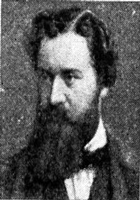Peace. A Study Poem by Charles Stuart Calverley
Peace. A Study
He stood, a worn-out City clerk —
Who'd toil'd, and seen no holiday,
For forty years from dawn to dark —
Alone beside Caermarthen Bay.
He felt the salt spray on his lips;
Heard children's voices on the sands;
Up the sun's path he saw the ships
Sail on and on to other lands;
And laugh'd aloud. Each sight and sound
To him was joy too deep for tears;
He sat him on the beach, and bound
A blue bandana round his ears
And thought how, posted near his door,
His own green door on Camden Hill,
Two bands at least, most likely more,
Were mingling at their own sweet will
Verdi with Vance. And at the thought
He laugh'd again, and softly drew
That Morning Herald that he'd bought
Forth from his breast, and read it through.
I doubt he had toiled for forty years from dawn till night. - still, poet's licence and all that. An excellent poem from the days when standing in the sun by a bay, reading a 'paper, and hearing a band (all free bar the 'paper) was enough to be called a holiday - albeit in the town where one lived!
I like this poem. The man is on holidayafter a gruelling forty years as a clerk in the City. He is happy to dream of far off places, and wears a bandana – emblem of piratical freedom. But he still reads the Herald. Vance was a music hall artist and composer of songs for the music hall. He began his career as a solicitor. The mix of his music and Verdi’s would have been truly cacophonous. This cacophony echos the dreadful competing noises of the City which the man has, at last, escaped. I do not understand “That Morning Herald” – I cannot find a newspaper called “Morning Herald” published in the UK The word “That” is odd”. Should this have been “that morning’s Herald”?
I enjoyed this piece primarily on its own merit with my meagre understanding but appreciated it more once i read Terence's remarks, which i found most helpful....tyvm
This poem seem not old..still now days resemblance often found..More and more people work for long, with little hollidays or none.. No time to live for anything, but work.. Still, they find power to go by squeezing time on their own, to read a bit or listen to some lovely poem such as this, or one song..
Loved reading through the comments, especially the historical context provided by Terrence George Craddock back in 2010. Why does the Clerk bind a blue bandana round his ears? This one phrase throws me for a loop and alters what, on the surface, seems to be a study in peace.
Oddly eerie that my own morning's peace involves a plate of ham and eggs and dialing up this lovely website where I often find the most pleasant things to read. And after this it appears that today will be most wonderful.
i read and liked PEACE A STUDY...and my favourite line was about 'holiday'....everyday for the CLerk is a holiday....representing peace at work for 40yrs..is a holiday.....peace a study...a dream
First time I've ever heard of this poet; first time I've ever read this poem. Fun! Sorta like a pun. I'll read one more, maybe two or three; if I read any more I'm sure I'd shriek.
so if there is no actual Morning Herald, is it a generic ad?
This poem has not been translated into any other language yet.
I would like to translate this poem
The poem ‘Peace. A Study’ by Charles Stuart Calverley is obviously political satire and seems to celebrate the end of the long and costly American Revolutionary War. If this assumption is correct the poem must have been written after October 1781 when General Cornwallis surrendered to General Washington at Yorktown, but before Calverley’s death in 1884. In Victorian England after the fall of the Duke of Wellington’s government in November 1830, most of the metropolitan press were heavily on the side of the Whigs, (supporters of the Revolution against the British, supporting the American side against the British in America) . Two exceptions were the Tory papers, the Morning Herald and, after 1834, the Times. The war was not popular in Britain and Calverley seems genuinely delighted that peace has been achieved. The possible meanings of the satire are intriguing. The City clerk is on holiday at Caermarthen Bay, an inlet of the south Wales coast, pronounced Bae Caerfyrddin in Welsh. Did trade support for the revolutionary war flourish in this area and why is the ‘worn-out City clerk’ so tired? Because of risk run in supporting a dangerous cause? The clerk is overcome with emotion and ‘laugh'd aloud. (at) Each sight and sound’. The line ‘To him was joy too deep for tears; ’ heightens this ecstasy of celebration and references a line from William Wordsworth's, 'Intimations of Immortality.' Is this a reference to lives lost in the war and eternal fame achieved by some fighting in this cause? Calverley thinks of the two bands at least celebrating the peace near his home, the famous green doors of the Camden Hill suburb in London, were a famous landmark. The narrator’s first laugh was upon spying the ships sailing up the ‘sun’s path’ to other lands. This seems to indicate a joy in knowing these ships no longer contain British soldiers sailing off to war. Reinforcements of 7000 British soldiers arrived just after the surrender at Yorktown. The poem is infused with a joy of holiday and children at play and the Morning Herald seems to contain news of the peace settlement. Like so much great political satire, the title ‘Peace. A study’ is key to the real meaning of the poem and hints at hidden intrigue.